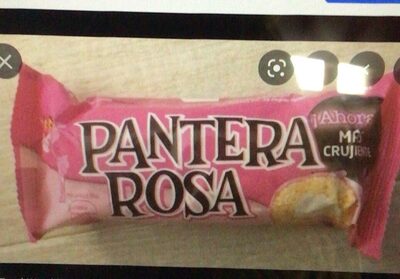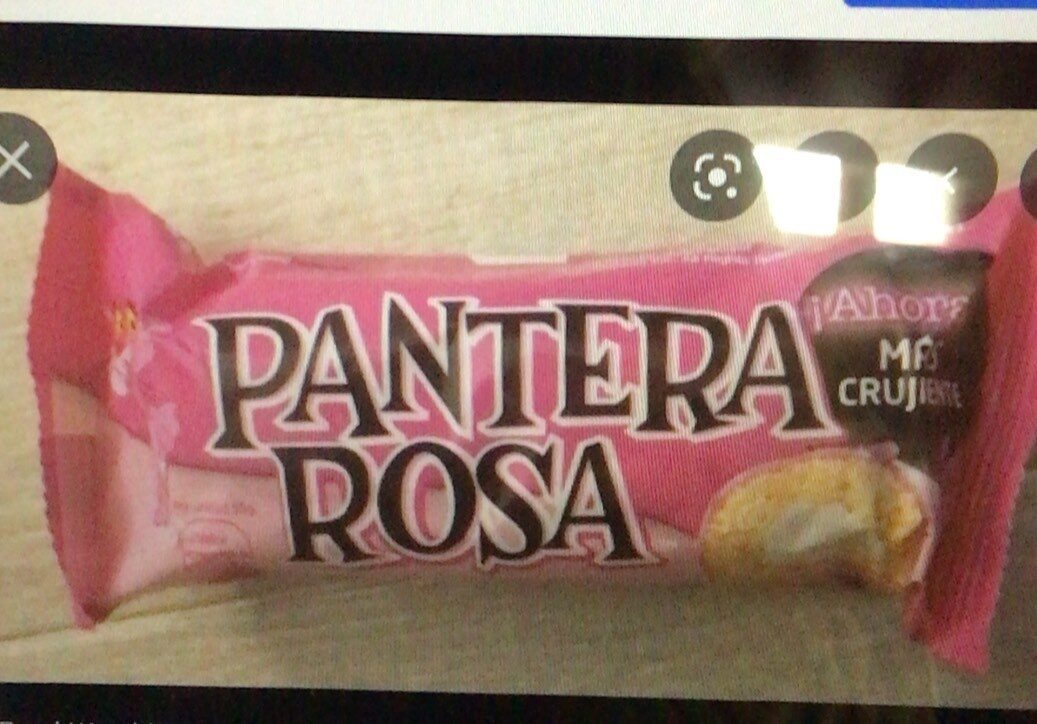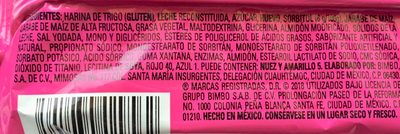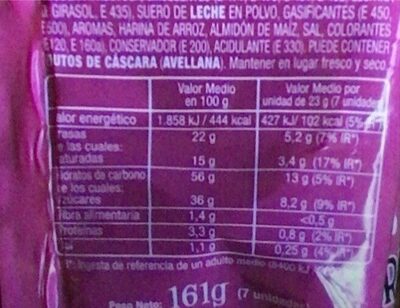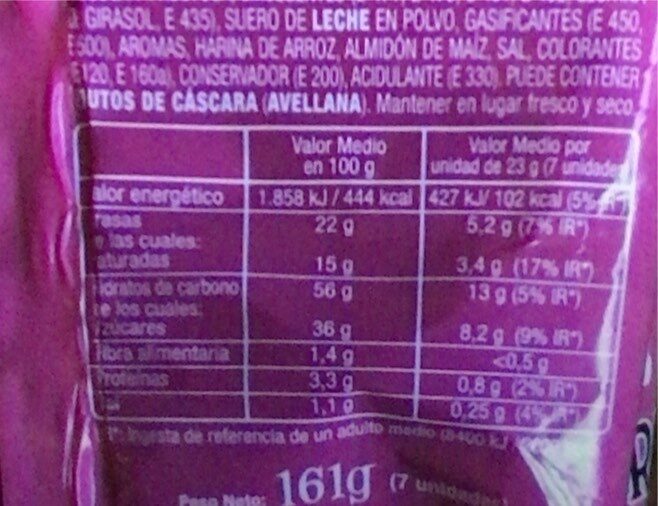Help us make food transparency the norm!
As a non-profit organization, we depend on your donations to continue informing consumers around the world about what they eat.
The food revolution starts with you!
pantera rosa - Marinela - 50 g
pantera rosa - Marinela - 50 g
This product page is not complete. You can help to complete it by editing it and adding more data from the photos we have, or by taking more photos using the app for Android or iPhone/iPad. Thank you!
×
Barcode: 7501030429562 (EAN / EAN-13)
Common name: Pastelito de harina de trigo
Quantity: 50 g
Categories: es:Pan dulce
Origin of ingredients: Mexico
Manufacturing or processing places: Cdmx
Countries where sold: Mexico
Matching with your preferences
Health
Ingredients
-
30 ingredients
: Harina de trigo (gluten), leche reconstituida, azúcar, huevo, sorbitol (6g/100g), jarabe de maíz, jarabe de maíz de alta fructosa, grasa vegetal, maltodextrina, glicerina, almidón modificado, sólidos de la leche, sal yodada, mono y diglicéridos, ésteres de poliglicerol de ácidos grasos, saborizante artificial y natural, propionato sódico, monoestearato de sorbitán, monoestearato de sorbitán polioxietilenado, sorbato potásico, ácido sórbico, goma xantana, enzimas, almidón, estearolil lactilato de sodio, cmc sódica, dióxido de titanio, lecitina de soya, rojo 40, azul 1Allergens: Eggs, Gluten, SoybeansTraces: Nuts, es:amarillo-5
Food processing
-
Ultra processed foods
Elements that indicate the product is in the 4 - Ultra processed food and drink products group:
- Additive: E129 - Allura red
- Additive: E14XX - Modified Starch
- Additive: E171 - Titanium dioxide
- Additive: E322 - Lecithins
- Additive: E415 - Xanthan gum
- Additive: E420 - Sorbitol
- Additive: E422 - Glycerol
- Additive: E435 - Polyoxyethylene sorbitan monostearate
- Additive: E466 - Sodium carboxy methyl cellulose
- Ingredient: Flavouring
- Ingredient: Glucose
- Ingredient: High fructose corn syrup
- Ingredient: Maltodextrin
Food products are classified into 4 groups according to their degree of processing:
- Unprocessed or minimally processed foods
- Processed culinary ingredients
- Processed foods
- Ultra processed foods
The determination of the group is based on the category of the product and on the ingredients it contains.
Additives
-
E129 - Allura red
Allura Red AC: Allura Red AC is a red azo dye that goes by several names, including FD&C Red 40. It is used as a food dye and has the E number E129. It is usually supplied as its red sodium salt, but can also be used as the calcium and potassium salts. These salts are soluble in water. In solution, its maximum absorbance lies at about 504 nm.Source: Wikipedia
-
E171 - Titanium dioxide
Titanium dioxide: Titanium dioxide, also known as titaniumIV oxide or titania, is the naturally occurring oxide of titanium, chemical formula TiO2. When used as a pigment, it is called titanium white, Pigment White 6 -PW6-, or CI 77891. Generally, it is sourced from ilmenite, rutile and anatase. It has a wide range of applications, including paint, sunscreen and food coloring. When used as a food coloring, it has E number E171. World production in 2014 exceeded 9 million metric tons. It has been estimated that titanium dioxide is used in two-thirds of all pigments, and the oxide has been valued at $13.2 billion.Source: Wikipedia
-
E200 - Sorbic acid
Sorbic acid: Sorbic acid, or 2‚4-hexadienoic acid, is a natural organic compound used as a food preservative. It has the chemical formula CH3-CH-4CO2H. It is a colourless solid that is slightly soluble in water and sublimes readily. It was first isolated from the unripe berries of the Sorbus aucuparia -rowan tree-, hence its name.Source: Wikipedia
-
E202 - Potassium sorbate
Potassium sorbate (E202) is a synthetic food preservative commonly used to extend the shelf life of various food products.
It works by inhibiting the growth of molds, yeast, and some bacteria, preventing spoilage. When added to foods, it helps maintain their freshness and quality.
Some studies have shown that when combined with nitrites, potassium sorbate have genotoxic activity in vitro. However, potassium sorbate is generally recognized as safe (GRAS) by regulatory authorities.
-
E281 - Sodium propionate
Sodium propionate: Sodium propanoate or sodium propionate is the sodium salt of propionic acid which has the chemical formula Na-C2H5COO-. This white crystalline solid is deliquescent in moist air.Source: Wikipedia
-
E322 - Lecithins
Lecithins are natural compounds commonly used in the food industry as emulsifiers and stabilizers.
Extracted from sources like soybeans and eggs, lecithins consist of phospholipids that enhance the mixing of oil and water, ensuring smooth textures in various products like chocolates, dressings, and baked goods.
They do not present any known health risks.
-
E322i - Lecithin
Lecithins are natural compounds commonly used in the food industry as emulsifiers and stabilizers.
Extracted from sources like soybeans and eggs, lecithins consist of phospholipids that enhance the mixing of oil and water, ensuring smooth textures in various products like chocolates, dressings, and baked goods.
They do not present any known health risks.
-
E415 - Xanthan gum
Xanthan gum (E415) is a natural polysaccharide derived from fermented sugars, often used in the food industry as a thickening and stabilizing agent.
This versatile food additive enhances texture and prevents ingredient separation in a wide range of products, including salad dressings, sauces, and gluten-free baked goods.
It is considered safe for consumption even at high intake amounts.
-
E420 - Sorbitol
Sorbitol: Sorbitol --, less commonly known as glucitol --, is a sugar alcohol with a sweet taste which the human body metabolizes slowly. It can be obtained by reduction of glucose, which changes the aldehyde group to a hydroxyl group. Most sorbitol is made from corn syrup, but it is also found in nature, for example in apples, pears, peaches, and prunes. It is converted to fructose by sorbitol-6-phosphate 2-dehydrogenase. Sorbitol is an isomer of mannitol, another sugar alcohol; the two differ only in the orientation of the hydroxyl group on carbon 2. While similar, the two sugar alcohols have very different sources in nature, melting points, and uses.Source: Wikipedia
-
E422 - Glycerol
Glycerol: Glycerol -; also called glycerine or glycerin; see spelling differences- is a simple polyol compound. It is a colorless, odorless, viscous liquid that is sweet-tasting and non-toxic. The glycerol backbone is found in all lipids known as triglycerides. It is widely used in the food industry as a sweetener and humectant and in pharmaceutical formulations. Glycerol has three hydroxyl groups that are responsible for its solubility in water and its hygroscopic nature.Source: Wikipedia
-
E466 - Sodium carboxy methyl cellulose
Carboxymethyl cellulose: Carboxymethyl cellulose -CMC- or cellulose gum or tylose powder is a cellulose derivative with carboxymethyl groups --CH2-COOH- bound to some of the hydroxyl groups of the glucopyranose monomers that make up the cellulose backbone. It is often used as its sodium salt, sodium carboxymethyl cellulose.Source: Wikipedia
Ingredients analysis
-
May contain palm oil
Ingredients that may contain palm oil: Vegetable fat
-
Non-vegan
Non-vegan ingredients: Milk, Egg, Milk solidsSome ingredients could not be recognized.
We need your help!
You can help us recognize more ingredients and better analyze the list of ingredients for this product and others:
- Edit this product page to correct spelling mistakes in the ingredients list, and/or to remove ingredients in other languages and sentences that are not related to the ingredients.
- Add new entries, synonyms or translations to our multilingual lists of ingredients, ingredient processing methods, and labels.
If you would like to help, join the #ingredients channel on our Slack discussion space and/or learn about ingredients analysis on our wiki. Thank you!
-
Vegetarian status unknown
Unrecognized ingredients: es:mono-y-digliceridos, es:esteres-de-poliglicerol-de-acidos-grasos, es:monoestearato-de-sorbitan, es:estearolil-lactilato-de-sodio, es:azul-1Some ingredients could not be recognized.
We need your help!
You can help us recognize more ingredients and better analyze the list of ingredients for this product and others:
- Edit this product page to correct spelling mistakes in the ingredients list, and/or to remove ingredients in other languages and sentences that are not related to the ingredients.
- Add new entries, synonyms or translations to our multilingual lists of ingredients, ingredient processing methods, and labels.
If you would like to help, join the #ingredients channel on our Slack discussion space and/or learn about ingredients analysis on our wiki. Thank you!
-
Details of the analysis of the ingredients
We need your help!
Some ingredients could not be recognized.
We need your help!
You can help us recognize more ingredients and better analyze the list of ingredients for this product and others:
- Edit this product page to correct spelling mistakes in the ingredients list, and/or to remove ingredients in other languages and sentences that are not related to the ingredients.
- Add new entries, synonyms or translations to our multilingual lists of ingredients, ingredient processing methods, and labels.
If you would like to help, join the #ingredients channel on our Slack discussion space and/or learn about ingredients analysis on our wiki. Thank you!
: Harina de trigo, leche, azúcar, huevo, sorbitol, jarabe de maíz, jarabe de maíz de alta fructosa, grasa vegetal, maltodextrina, glicerina, almidón modificado, sólidos de la leche, sal yodada, mono- y diglicéridos, ésteres de poliglicerol de ácidos grasos, saborizante artificial y natural, propionato sódico, monoestearato de sorbitán, monoestearato de sorbitán polioxietilenado, sorbato potásico, ácido sórbico, goma xantana, enzimas, almidón, estearolil lactilato de sodio, cmc sódica, dióxido de titanio, lecitina de soya, rojo 40, azul 1- Harina de trigo -> en:wheat-flour - vegan: yes - vegetarian: yes - ciqual_proxy_food_code: 9410 - percent_min: 3.33333333333333 - percent_max: 100
- leche -> en:milk - vegan: no - vegetarian: yes - ciqual_proxy_food_code: 19051 - percent_min: 0 - percent_max: 50
- azúcar -> en:sugar - vegan: yes - vegetarian: yes - ciqual_proxy_food_code: 31016 - percent_min: 0 - percent_max: 33.3333333333333
- huevo -> en:egg - vegan: no - vegetarian: yes - ciqual_food_code: 22000 - percent_min: 0 - percent_max: 25
- sorbitol -> en:e420 - vegan: yes - vegetarian: yes - percent_min: 0 - percent_max: 20
- jarabe de maíz -> en:corn-syrup - vegan: yes - vegetarian: yes - ciqual_proxy_food_code: 31089 - percent_min: 0 - percent_max: 16.6666666666667
- jarabe de maíz de alta fructosa -> en:high-fructose-corn-syrup - vegan: yes - vegetarian: yes - ciqual_food_code: 31077 - percent_min: 0 - percent_max: 14.2857142857143
- grasa vegetal -> en:vegetable-fat - vegan: yes - vegetarian: yes - from_palm_oil: maybe - percent_min: 0 - percent_max: 12.5
- maltodextrina -> en:maltodextrin - vegan: yes - vegetarian: yes - percent_min: 0 - percent_max: 11.1111111111111
- glicerina -> en:e422 - vegan: maybe - vegetarian: maybe - percent_min: 0 - percent_max: 10
- almidón modificado -> en:modified-starch - vegan: yes - vegetarian: yes - ciqual_proxy_food_code: 9510 - percent_min: 0 - percent_max: 9.09090909090909
- sólidos de la leche -> en:milk-solids - vegan: no - vegetarian: yes - ciqual_proxy_food_code: 19051 - percent_min: 0 - percent_max: 8.33333333333333
- sal yodada -> en:iodised-salt - vegan: yes - vegetarian: yes - ciqual_food_code: 11058 - percent_min: 0 - percent_max: 1.1
- mono- y diglicéridos -> es:mono-y-digliceridos - percent_min: 0 - percent_max: 1.1
- ésteres de poliglicerol de ácidos grasos -> es:esteres-de-poliglicerol-de-acidos-grasos - percent_min: 0 - percent_max: 1.1
- saborizante artificial y natural -> en:natural-and-artificial-flavouring - vegan: maybe - vegetarian: maybe - percent_min: 0 - percent_max: 1.1
- propionato sódico -> en:e281 - vegan: yes - vegetarian: yes - percent_min: 0 - percent_max: 1.1
- monoestearato de sorbitán -> es:monoestearato-de-sorbitan - percent_min: 0 - percent_max: 1.1
- monoestearato de sorbitán polioxietilenado -> en:e435 - vegan: maybe - vegetarian: maybe - percent_min: 0 - percent_max: 1.1
- sorbato potásico -> en:e202 - vegan: yes - vegetarian: yes - percent_min: 0 - percent_max: 1.1
- ácido sórbico -> en:e200 - vegan: yes - vegetarian: yes - percent_min: 0 - percent_max: 1.1
- goma xantana -> en:e415 - vegan: yes - vegetarian: yes - percent_min: 0 - percent_max: 1.1
- enzimas -> en:enzyme - vegan: maybe - vegetarian: maybe - percent_min: 0 - percent_max: 1.1
- almidón -> en:starch - vegan: yes - vegetarian: yes - ciqual_proxy_food_code: 9510 - percent_min: 0 - percent_max: 1.1
- estearolil lactilato de sodio -> es:estearolil-lactilato-de-sodio - percent_min: 0 - percent_max: 1.1
- cmc sódica -> en:e466 - vegan: yes - vegetarian: yes - percent_min: 0 - percent_max: 1.1
- dióxido de titanio -> en:e171 - vegan: yes - vegetarian: yes - percent_min: 0 - percent_max: 1.1
- lecitina de soya -> en:soya-lecithin - vegan: yes - vegetarian: yes - ciqual_food_code: 42200 - percent_min: 0 - percent_max: 1.1
- rojo 40 -> en:e129 - vegan: yes - vegetarian: yes - percent_min: 0 - percent_max: 1.1
- azul 1 -> es:azul-1 - percent_min: 0 - percent_max: 1.1
Nutrition
-
Bad nutritional quality
⚠ ️Warning: the amount of fruits, vegetables and nuts is not specified on the label, it was estimated from the list of ingredients: 0This product is not considered a beverage for the calculation of the Nutri-Score.
Positive points: 1
- Proteins: 2 / 5 (value: 3.3, rounded value: 3.3)
- Fiber: 1 / 5 (value: 1.4, rounded value: 1.4)
- Fruits, vegetables, nuts, and colza/walnut/olive oils: 0 / 5 (value: 0, rounded value: 0)
Negative points: 26
- Energy: 5 / 10 (value: 1858, rounded value: 1858)
- Sugars: 7 / 10 (value: 36, rounded value: 36)
- Saturated fat: 10 / 10 (value: 15, rounded value: 15)
- Sodium: 4 / 10 (value: 440, rounded value: 440)
The points for proteins are not counted because the negative points are greater or equal to 11.
Nutritional score: (26 - 1)
Nutri-Score:
-
Nutrient levels
-
Fat in high quantity (22%)
What you need to know- A high consumption of fat, especially saturated fats, can raise cholesterol, which increases the risk of heart diseases.
Recommendation: Limit the consumption of fat and saturated fat- Choose products with lower fat and saturated fat content.
-
Saturated fat in high quantity (15%)
What you need to know- A high consumption of fat, especially saturated fats, can raise cholesterol, which increases the risk of heart diseases.
Recommendation: Limit the consumption of fat and saturated fat- Choose products with lower fat and saturated fat content.
-
Sugars in high quantity (36%)
What you need to know- A high consumption of sugar can cause weight gain and tooth decay. It also augments the risk of type 2 diabetes and cardio-vascular diseases.
Recommendation: Limit the consumption of sugar and sugary drinks- Sugary drinks (such as sodas, fruit beverages, and fruit juices and nectars) should be limited as much as possible (no more than 1 glass a day).
- Choose products with lower sugar content and reduce the consumption of products with added sugars.
-
Salt in moderate quantity (1.1%)
What you need to know- A high consumption of salt (or sodium) can cause raised blood pressure, which can increase the risk of heart disease and stroke.
- Many people who have high blood pressure do not know it, as there are often no symptoms.
- Most people consume too much salt (on average 9 to 12 grams per day), around twice the recommended maximum level of intake.
Recommendation: Limit the consumption of salt and salted food- Reduce the quantity of salt used when cooking, and don't salt again at the table.
- Limit the consumption of salty snacks and choose products with lower salt content.
-
-
Nutrition facts
Nutrition facts As sold
for 100 g / 100 mlAs sold
per serving (50 g)Compared to: es:pan-dulce Energy 1,858 kj
(444 kcal)929 kj
(222 kcal)+13% Fat 22 g 11 g +29% Saturated fat 15 g 7.5 g +82% Carbohydrates 56 g 28 g +6% Sugars 36 g 18 g +45% Fiber 1.4 g 0.7 g +84% Proteins 3.3 g 1.65 g -33% Salt 1.1 g 0.55 g +45% Fruits‚ vegetables‚ nuts and rapeseed‚ walnut and olive oils (estimate from ingredients list analysis) 0 % 0 %
Environment
-
Eco-Score not computed - Unknown environmental impact
We could not compute the Eco-Score of this product as it is missing some data, could you help complete it?Could you add a precise product category so that we can compute the Eco-Score? Add a category
Packaging
-
Packaging with a medium impact
-
Packaging parts
Wrapper (Plastic)
-
Packaging materials
Material % Packaging weight Packaging weight per 100 g of product Plastic
-
Transportation
-
Origins of ingredients
Origins of ingredients with a high impact
Origin of the product and/or its ingredients % of ingredients Impact Mexico 100 %High
Report a problem
-
Incomplete or incorrect information?
Category, labels, ingredients, allergens, nutritional information, photos etc.
If the information does not match the information on the packaging, please complete or correct it. Open Food Facts is a collaborative database, and every contribution is useful for all.
Data sources
Product added on by openfoodfactsmx
Last edit of product page on by packbot.
Product page also edited by ecoscore-impact-estimator, kiliweb, tacite-mass-editor, yuka.sY2b0xO6T85zoF3NwEKvlkxgYv_EvQzkCTbfyFOxwI6wDM2zXslDv4Tga6o.
